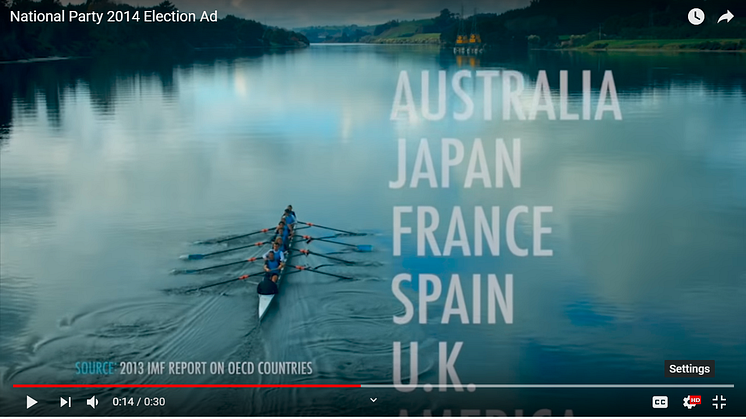
News -
Eminem wins lawsuit for sound-alike song used in political ad
The National Party of New Zealand has had damages payable to rapper Eminem reduced to NZ$225,000, after getting into trouble with the publisher for using a song that sounded a lot like rapper Eminem’s Lose Yourself in a political ad.
You can see the ad here. It was broadcast 186 times on television over 11 days in 2014. And in case you do not know the popular song by Eminem, you can listen to it on YouTube here.
The good news for the National Party is that they recently won an appeal to reduce the damages they have to pay to Eminem. Instead of NZ$600,000, they now have to pay NZ$225,000.
The sound-alike song, called Eminem Esque, was produced by Los Angeles composer Michael Cohen. In their defence, the National Party said the song was bought from a reputable Australian-based production library, which in turn was bought from a United States supplier.
The ruling by the New Zealand High Court stated: “Eminem Esque has substantially copied Lose Yourself”.
“The differences between the two works are minimal; the close similarities and the indiscernible differences in drum beat, the ‘melodic line’ and the piano figures make Eminem Esque strikingly similar to Lose Yourself. Eminem Esque substantially reproduces the essence of Lose Yourself. The parts of Eminem Esque used in the National Party’s campaign advertisements also substantially reproduce Lose Yourself.”
The National Party has said it will try to pass on any liability for damages to the parties involved in choosing, sourcing, providing, or licensing the Eminem Esque music.
The lawsuit for the song, which is regarded as Eminem’s most popular song in his catalogue, can be seen a major milestone in music copyright as it sounds as a warning to industries that try to copy famous songs at a cheaper price.
The advertising industry is known for using sound-alike songs to skirt around copyright in advertisements for yogurt, cars and even banks.
There is an entire industry that shadows the music industry - sound-alike songs have been around for a long time. Back in 1950, Carl Doshay of Tops Records hit upon the idea to copy hit songs, using session musicians to record almost-identical sounding versions of popular songs by singers such as Hank Williams, Frankie Laine, and Pat Boone. He sold the records at a cheaper price of 39 cents than those on the market which cost 79 to 99 cents. The records sold very well and the sound-alike industry was born. Soon other companies got into the business and the idea even spread across the ocean to the Britain, where the brand Top Of The Pops sold sound-alike records. It is no accident that the sound-alike brand is named after the television show, to which it has no relation.
Sound-alikes have also spread to the rest of the world. Although consumers wised up in the ‘90s and industry output waned, there has been a resurgence in this era of music streaming. On music streaming service Spotify if you are not careful you may find yourself listening to sound-alikes. When Taylor Swift famously left Spotify in 2014, there were a number of sound-alike songs to fill the void. Likewise, cover bands of classic rock band Led Zeppelin, which counts “Lez Zeppelin” among them, received a good amount of streaming on Spotify, until the original band itself arrived on the platform in 2013. Today, it is not difficult to find sound-alikes for hit songs such as Kelly Clarkson’s “Since U Been Gone” or Pharrell Williams’ “Happy” on the service.
The companies behind these sound-alikes count on royalty payouts from Spotify. And they might help Spotify pay less to the popular artists. The company has been accused of allowing the existence of sound-alikes on its very popular playlists, which tricks listeners into thinking the artists actually exist and limits the opportunities for real music-makers to make money.
Eminem himself was not involved in the lawsuit. His music publishers had previously gone to court over the same 2002 song, when they sued Apple for using the song in an advertisement without their permission.
The case was eventually settled out of court. As a Creator, Eminem did not give permission for his track, or even a sound-alike, to be used. And it is the right of Creators to assert and protect their intellectual property.
Related links
- Eminem wins $600,000 after New Zealand political party breached his copyright
- 2014 campaign ad by the National Party
- Eminem's Lose Yourself
- Soundalike Songs Are a Two-Faced Business
- Sounds like a hit: the numbers game behind Spotify cover songs
- How Spammers, Superstars, and Tech Giants Gamed Music
- National wins Eminem copyright row appeal, but still must pay $225,000
- Rapper Eminem sues Apple (again)
